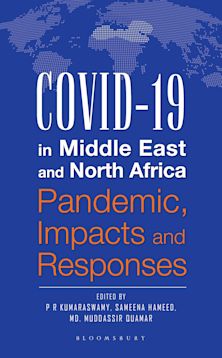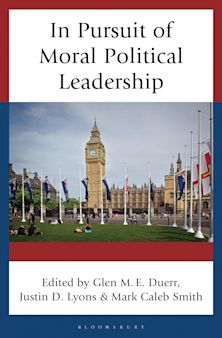- Home
- ACADEMIC
- Politics & International Relations
- Comparative Politics
- The Challenge of Sustaining Democracy in Deeply Divided Societies
The Challenge of Sustaining Democracy in Deeply Divided Societies
Citizenship, Rights, and Ethnic Conflicts in India and Israel
The Challenge of Sustaining Democracy in Deeply Divided Societies
Citizenship, Rights, and Ethnic Conflicts in India and Israel
This product is usually dispatched within 1 week
- Delivery and returns info
-
Free US delivery on orders $35 or over
You must sign in to add this item to your wishlist. Please sign in or create an account
Description
In this book, Harel-Shalev analyzes public policy and governmental features in procedurally democratic states that govern deeply divided societies. The book traces the political formula that enables such states to survive while sustaining a democratic process in the face of religious, ethnic, and national conflicts. It investigates citizenship discourses, analyzes the mechanisms political regimes use to give rights to minorities while simultaneously limiting their power, and illustrates how this unique political formula can be applied in two case studies of vastly different countries-Israel and India. The analogous conflicts in India and Israel that threaten the survival of democracy-the ethno-religious conflict between Hindus and Muslims in India and the ethno-national conflict between Jews and Arab-Palestinians in Israel-are analyzed in depth. In addition, the core cases of India and Israel, states in which democracy has survived for over sixty years, are compared with two additional countries where democracy was short-lived.
This issue is especially pertinent to the world today, as many young nations currently in the process of state building are coping with the challenges inherent in building democratic institutions in plural and polarized societies. The book explores the inherent tension between the conflicting logics of democracy, citizenship, and nation-state, and suggests enhanced tools for investigating societies in which this tension exists.
Table of Contents
2 Acknowledgements
Part 3 I. A Conceptual Framework
Chapter 4 1.Democracy in deeply divided societies: Theoretical and comparative aspects
Part 5 II. Disaggregating Citizenship in Deeply Divided Societies-Empirical and Analytical findings
Chapter 6 2.The Formative Years-A Base to Majority-Minority Relations in Deeply Divided Societies
Chapter 7 3.Public and Judicial Policy toward the Minority Throughout 60 years of Independence
Chapter 8 4.Placing the Comparison in a Broader Context-Democracies That Did Not Survive
Part 9 III. Comparative and Theoretical Findings
Chapter 10 5.Conclusions-he Fate of Democracy In Deeply Divided Societies
11 Bibliography
13 About the Author
Product details
| Published | Aug 04 2010 |
|---|---|
| Format | Hardback |
| Edition | 1st |
| Extent | 514 |
| ISBN | 9780739126844 |
| Imprint | Lexington Books |
| Dimensions | 9 x 6 inches |
| Series | Studies in Public Policy |
| Publisher | Bloomsbury Publishing |
About the contributors
Reviews
-
Harel-Shalev is offering a path-breaking, genuine, and astute comparison between two highly divided societies- India and Israel, examining how they could have survived with democratic structures for about sixty years heretofore. While harnessing an impressive bulk of original primary sources, this book is offering some remarkable and vital arguments. It is a must read and an enjoyable book.
Gad Barzilai, University of Washington
-
Harel-Shalev's study is outstanding. Finally, a cogent, and intelligent analysis of the myriad ways deeply divided societies maintain and negotiate democratic practices. This book will prove to be essential reading for anyone interested in the topics of identity politics, public policy and democracy.
Rebecca Kook, Ben Gurion University
-
Harel-Shalev's surprising choice of comparative case studies offers original insight into the way by which public policies that aim at legal institutionalization of rights may provide both political stability and gradual counter-hegemonic transformation.Her analysis is of particular significance for those interested in learning new ways of thinking about the interplay between democratic political processes and majority-minority relations in deeply divided societiessss
Dan Avnon, The Hebrew University of Jerusalem
-
Harel-Shalev's surprising choice of comparative case studies offers original insight into the way by which public policies that aim at legal institutionalization of rights may provide both political stability and gradual counter-hegemonic transformation. Her analysis is of particular significance for those interested in learning new ways of thinking about the interplay between democratic political processes and majority-minority relations in deeply divided societies
Dan Avnon, The Hebrew University of Jerusalem
-
Ayelet Harel-Shalev has produced an important, comprehensive study of an especially pertinent issue. The depth of material provided is remarkable….This book is plainly worthy of scholarly attention by all students of comparative politics, especially those concerned about the future of democracies in pluralistic societies.
Law and Politics Book Review
-
This book lays a strong foundation for dealing with several issues. Its conceptualization of them is useful and creative. It sets a comprehensive agenda for future research.
Nationalism and Ethnic Politics



































